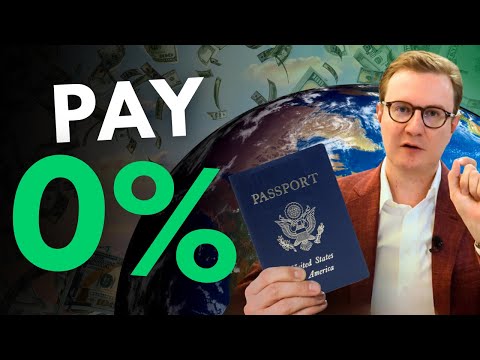Does Puerto Rico Pay Taxes to the US?
June 20, 2025
It’s a common question and one that often fuels confusion, debate, and a fair share of misinformation – Do residents of Puerto Rico actually pay US federal taxes?
When most people think of US tax obligations, they naturally assume they apply uniformly across all US citizens.
But when it comes to Puerto Rico, things are more complicated and often misunderstood.
That’s because Puerto Rico isn’t a US state but an unincorporated territory of the United States. Its residents are US citizens by birth, carry US passports, and serve in the military, but their interaction with the US federal tax system is far from straightforward.
In recent years, the island has gained attention for its unique tax advantages, especially among high-net-worth individuals (HWNIs) and entrepreneurs seeking to reduce their federal tax burden without giving up US citizenship or relocating overseas.
As a result, interest in Puerto Rico’s tax rules has surged, but so has confusion and misinformation.
At the heart of the issue is a key distinction: Puerto Rico residents do pay certain federal taxes, but not all of them.
For example, they’re generally exempt from US federal income tax on income sourced within Puerto Rico. However, they may still be liable for other federal taxes, including Social Security, Medicare, and income earned outside the island.
Understanding exactly which taxes apply depends on several factors: residency status, where the income is sourced, and participation in federal programs.
And while Puerto Rico offers some genuinely attractive tax incentives, especially under Acts 60, 20, and 22, the rules are not a one-size-fits-all solution.
That’s why the Nomad Capitalist team has broken down the facts about tax in Puerto Rico – separating tax myths from reality – to help clarify how US federal taxes apply (or don’t apply) to residents of Puerto Rico.
Do Puerto Ricans Pay Taxes to the US?

Puerto Ricans pay federal taxes, but the types and amounts can vary significantly depending on their circumstances.
You only have to pay federal income tax if you fall into specific categories.
These include working for the federal government, doing business with the federal government, being a US military member, earning income from sources outside Puerto Rico or if you’re a Puerto Rico-based corporation that intends to send funds to the US.
Despite not paying federal income taxes in many cases, Puerto Rican residents contribute significantly to the US Treasury.
In 2024, Puerto Rico residents paid an average of US$22,469 in federal taxes, more than US$5 billion in total.
Most of this was not from income taxes.
It came from other federal taxes, such as payroll, Medicare, social security, self-employment, unemployment and customs and merchandise taxes.
It’s also worth noting that while Puerto Rico residents pay these federal taxes, they do not receive the same federal benefits as US state residents.
They are excluded from specific programs or foreign tax credit, such as Supplemental Security Income (SSI) and the Federal Earned Income Tax Credit (EITC).
If you’re interested in whether Puerto Ricans pay US taxes, you may be considering the island’s potential as a low-tax base.
Is Puerto Rico A Tax Haven?
Act 60 is the cornerstone of Puerto Rico’s tax incentives. It combines what were previously known as Acts 20 and 22 and offers some excellent benefits.
Businesses providing export services have a flat 4% corporate income tax rate, one of the lowest in the Western hemisphere. This rate applies if you’re exporting services to non-Puerto Rican clients.
As a bona fide resident of Puerto Rico, you’ll enjoy 0% tax on dividends, interest and capital gains from Puerto Rican sources.
This means there is no local tax on investment income if it’s sourced from within Puerto Rico. Long-term capital gains from assets acquired after becoming a resident are entirely tax-free.
Even gains from assets owned before residency can qualify for a reduced 5% tax rate if sold after ten years of residency.
Additionally, there are significant reductions on property taxes for both businesses and personal properties, with exemptions reaching up to 75% for certain activities.
You must be a bona fide Puerto Rico resident to get these benefits.
Gaining residency involves several key steps.
A cornerstone of this is meeting the physical presence test.
The most direct way to qualify is by spending at least 183 days in Puerto Rico during the tax year. However, if you do not meet that specific number, there are other ways to satisfy the test.
The first is to be present in Puerto Rico for at least 549 days during a three-year period.
That includes the current tax year and the two immediately preceding tax years, with at least 60 days in each of those years.
If you don’t meet this requirement, alternative conditions include:
- Not spending over 90 days in the US mainland during the tax year
- Earning no more than US$3,000 in the US
- Having no significant connections to the US during the tax year.
It’s worth noting that you can count up to 30 days of travel abroad towards your Puerto Rico days.
Pros and Cons of Moving to Puerto Rico
While the tax incentives are a powerful draw, the decision to relocate to Puerto Rico has to be made with a clear understanding of the pros and cons.
Puerto Rico generally has a lower cost of living than the US mainland.
It boasts stunning beaches, rainforests and mountains and a blend of Caribbean, Spanish, and American cultures that creates a lively atmosphere.
US citizens don’t need work permits or visas to live and work there.
Aside from these points, the tax incentives available in Puerto Rico are the biggest advantage.
US citizens who establish residency in the territory may be eligible for a federal income tax exemption on income earned within the territory.
You can move your business to Puerto Rico, and if you export services from Puerto Rico, you can pay a flat 4% tax rate and then a 0% dividend tax rate.
The idea of moving to Puerto Rico makes US citizens feel comfortable. They feel that they’re still on US soil, even though Puerto Rico is a very different place.
Many people find this easier to digest because they’re not leaving the United States, which means they don’t have to renounce their US citizenship.
If you can move from California to Florida, save on taxes, upend your family, and change your life, you can also go to Puerto Rico.
It’s an ideal starting point for Americans looking to move offshore because if you can uproot to Puerto Rico, you can go to Panama or anywhere else.
You also have the right to spend more time on the US mainland than you would if you were going offshore to take advantage of tax savings.
However, the downside is that you need a closer connection to Puerto Rico. You have to establish an actual bona fide life there.
That means you’re locked into spending significant time in Puerto Rico and legitimately being there.
Also, if you go offshore, you can take advantage of the foreign earned income exclusion. You can exclude up to US$130,000 of your income from your business and salary, plus standard deductions. You can exclude more if you have a spouse who works with you.
Living fully offshore, as long as that country has a friendly tax policy, means your potential tax rate can be zero in that country.
The question is, how much money are you making?
If you’re making millions of dollars a year in the United States and spending time on the US mainland is important to you, then Puerto Rico may be a great deal.
However, going offshore gives you more flexibility under the Foreign Earned Income Exclusion.
Moving to Puerto Rico: How to Navigate the Process

Before moving, you should visit Puerto Rico to get a feel for the place and ensure it meets your lifestyle and business needs.
Some people complain about feeling trapped on the island and not fitting in if they don’t speak Spanish. While English is widely spoken in tourist areas, Spanish is the primary language.
It is highly recommended that you do a recon trip to see if it’s somewhere that you’d actually enjoy spending more than six months a year.
After all, this is a life-changing decision, and you must be sure it’s a good fit for you.
In terms of the application, you must apply for a tax exemption decree through the Single Business Portal (SBP) online application platform.
To be eligible, you can’t have been a resident of Puerto Rico for at least ten years prior.
For individual investors, there’s a one-time filing fee of US$5,000. You’ll need to provide detailed information about your business or investment activities, proving your intent to become a bona fide resident.
Then, to establish residency, you must purchase a property within two years of moving. This helps satisfy the closer connection test, which requires that you have more substantial ties to Puerto Rico than to the mainland of the United States.
You’ll also need to get a Puerto Rican driver’s license, register to vote, move your bank accounts and make Puerto Rico your tax home.
There are also yearly charitable contributions. For individual investors, this is set at US$10,000 annually to local nonprofits, demonstrating your commitment to the community.
You should keep meticulous records of your days in Puerto Rico, including travel records, to prove that you meet the presence test. Should the IRS conduct an audit, this documentation is indispensable.
You’ll need to file an annual report with a US$300 fee to maintain your tax benefits each year. This report will detail your compliance with residency and business operations.
The benefits aren’t just limited to individuals. Specific industries can also leverage these incentives.
They’re trying to attract specific industries to the island with reduced tax rates and exemptions under Act 60.
Tech and digital services businesses can take advantage of the export service decree and minimal taxation, as can manufacturing and tourism development.
The financial sector can benefit from a 100% tax exemption on dividends for international financial entities.
However, there are potential pitfalls, such as your US tax obligations.
Income earned from outside Puerto Rico still needs to be reported to the IRS if you’re a US citizen, as only Puerto Rican source income is exempt from US federal taxes.
The IRS is vigilant about these benefits, ensuring they’re not abused. There’s been increased scrutiny, and there’s always the risk of legislative changes that could affect these incentives.
Tax Benefits of Puerto Rico: FAQs
Yes. Being a resident of Puerto Rico entails reporting your taxes paid to the US federal government and filing a federal income tax return. In most cases, Puerto Rico residents pay customs taxes, federal commodity taxes, and all payroll taxes. However, not all residents are required to pay federal income taxes.
While Puerto Rico offers compelling tax incentives that could significantly reduce your tax liability, becoming a bona fide resident requires a genuine move and lifestyle change. You’ll have to spend most of the year on the island.
If you are running a business in the United States, either an LLC or a C corporation, and you have a high rate of taxation, you can move that business to Puerto Rico and pay a flat 4% tax. However, you need to run your business from Puerto Rico.
If you start incurring capital gains before you move to Puerto Rico, you will owe the full rate of tax on the earnings you’ve already accumulated. You can’t simply move to Puerto Rico, sell all your assets, and be capital gains tax-free. It’s not that easy.
The first is the physical presence test; you must be in Puerto Rico for 183 days per year. The next is the tax home test; Puerto Rico must be your tax home. You need to have a closer connection to Puerto Rico than the US mainland and establish a bona fide life there.
Eligible activities under Act 60 include exports of goods and services, individuals, insurance, finance, tourism, agriculture, energy, infrastructure, entrepreneurship and creative industries. The tax incentives for these activities last for 15 years.
Move to Puerto Rico or Go Overseas?
Moving to Puerto Rico is not a halfway house. You have to be all in. That matters because you don’t just get to leave all the trappings of your life on the US mainland. You have to establish an actual bona fide life in Puerto Rico.
In most situations, you need to be in Puerto Rico physically 183 days a year. This is not an area where you want to cut corners, or else the IRS will come down on you like a ton of bricks.
In contrast, going offshore gives you more flexibility under the Foreign Earned Income Exclusion and the potential for low or zero taxes elsewhere. You can choose where you’re going rather than being forced into Puerto Rico.
So the question is, why not go fully offshore?
If you want to live in four different places a year, you can. If you want to follow our trifecta approach and have a summer home, a winter home, and a home that’s a spring and fall place, you can.
If you want to take vacations to different countries and spend your summers in Europe, you can do that without having to put down roots anywhere.
And, you have the flexibility to change your mind. You’re not getting into one system that forces you to be there.
That’s a decision each person will make on their own. But Puerto Rico is not a panacea for everybody.
Act 60 will only work for certain types of businesses, and certain people don’t qualify. Regardless of that, do you want to live in Puerto Rico?
Is the lifestyle adjustment worth it for the tax savings, or would you rather have more freedom?
If you’re interested in Puerto Rico, other options can fulfil the same goals.
Whatever route you choose, it’ll take planning.
That’s where Nomad Capitalist comes in.
We help seven- and eight-figure entrepreneurs and investors create bespoke strategies using our uniquely successful methods. These strategies allow you to keep more money, make new wealth faster, and be protected from whatever happens in three steps.
At Nomad Capitalist, we have a network of lawyers, estate agents, accountants, and tax and company formation specialists worldwide.
All that expertise and real-world experience come together when we advise your holistic, bespoke action plan. Discover how we do things here.



U.S.-Malta Tax Treaty: Eligibility and Provisions in 2026 Explained
While Malta is a popular relocation destination due to its favourable tax system, obtaining Maltese tax residency may not protect you from U.S. tax liability. American citizens are subject to tax in the U.S. on global income and gains, regardless of their tax residency, which often results in double taxation. This makes tax treaties, which […]
Read more

The Benefits of the Investor Visa in the UAE: A 2026 Guide for Investors
The UAE’s tax-free personal income, business-friendly environment, and growing real-estate market have made it an attractive destination for foreign investors and high-net-worth individuals. One of the paths to obtaining a residence permit is through the Investor Visa, which enables individuals to live and buy real estate in the country. In this article, we’ll break down […]
Read more

How To Obtain a UAE Residency Permit by Buying Property: Requirements Explained
Due to its growing real estate market and zero-tax regime, the UAE, and particularly Dubai, has become a popular destination for high-net-worth expats and foreign investors. Expatriates are allowed to both purchase property in the UAE and obtain a residence permit through a qualifying real estate investment. In this guide, we will explain the terms […]
Read more





